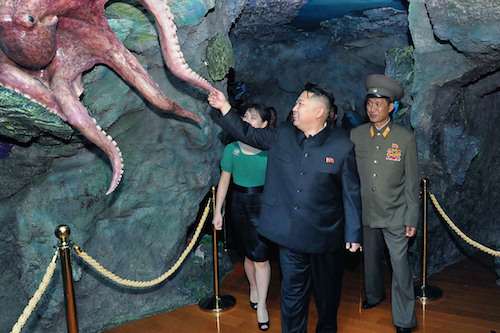The good news, if you are an asshole, is that James Franco and Seth Rogen are making another high-concept buddy movie. The bad news, if you are an even bigger asshole, is that the comic premise is Kim Jong Un. In The Interview, Franco and Rogen play journalists whom the CIA recruits to assassinate the North Korean dictator. Normally Kim has a great sense of humor about himself, but this time Hollywood has pushed it too far. According to a spokesman for North Korea’s Ministry of Foreign Affairs:
If the United States administration tacitly approves or supports the release of this film, we will take a decisive and merciless countermeasure…[The film] is the most blatant act of terrorism and an act of war that we will never tolerate.
Somewhere in the State Department, a whole office is dedicated to interacting with these people.
In age of total information awareness, North Korea remains a black box. Partly that’s because the totalitarian nation hasn’t quite followed us into the information age. Satellite images of the Korean peninsula at night infamously show a black space where the Democratic People’s Republic of Korea should be. The average North Korean uses 739 kilowatts of electricity a year, compared to their counterparts in South Korea who use 10,162. The DPRK is literally blacked out.
The lights are off figuratively, too. Very little unmediated news comes out of North Korea, so it’s hard to tell how convinced North Koreans really are by their own leader’s rhetoric. If the Kim regime has one defining feature, it’s a willingness to fake virtually everything; if it has a second d.f., then it’s the tendency to overestimate how well its fakery is working. The result is a kind of credulity gap when North Korea communicates with the outside world.
International rhetoric is generally characterized by restraint. Everyone has an interest in placating everybody else, so even open antagonists like Iran and the United States speak cordially of each other.*  North Korea, however, has no vested interest in anyone except China. And while it may or may not possess a nuclear weapon, it does not appear to have any means of delivering one. When North Korea communicates with the world, it is neither to negotiate nor to credibly threaten. It’s just to communicate.
North Korea, however, has no vested interest in anyone except China. And while it may or may not possess a nuclear weapon, it does not appear to have any means of delivering one. When North Korea communicates with the world, it is neither to negotiate nor to credibly threaten. It’s just to communicate.
Maybe that’s why the Ministry of Foreign Affairs called a feature film is “the most blatant act of terrorism,” which really puts Sept. 11 and the Lockheed bombing in perspective. And why not call a James Franco movie an act of war? North Korea is already basically at war with America and everyone else, at least as far as attitude is concerned. The part of war that involves shooting and materiel isn’t happening, but from the DPRK’s perspective, that’s probably just as well.
The DPRK’s perspective also explains its borderline hilarious understanding of how Hollywood works. The credulity gap works both ways, as evidenced by North Korea’s apparent assumption that Barack Obama could shut this thing down if he wanted. The Foreign Ministry threatened “merciless” retaliation “if the US administration allows and defends the showing of the film.”
Of course Kim thinks that the President of the United States allows movies. His own regime allows or forbids pretty much everything, so it makes sense that he would think that a more powerful leader would do the same thing. Also, he is insane.
This component of the rhetorical framework is tricky, because who’s to say how crazy a foreign leader is? But it’s worth noting that Kim Jong Un’s grandfather, Kim Il Sung, was also an absolute dictator. No one in this kid’s family even remembers what it’s like not to be a tyrant. As anyone who has tutored rich kids will tell you, it’s the ones whose parents never worked that give you trouble and/or have their uncles killed.
You’ll be glad to know that initial reports of his being torn apart by dogs were erroneous, albeit “perfectly plausible” according to The Daily News. The thing about North Korea is that nothing they say is believable, but pretty much anything they might do is. We are their sneering villain, and they are ours—which makes it all the more jarring when a regime spokesman speaks the truth:
Kim Myong-chol dismissed Hollywood movies as being “full of assassinations and executions” and expressed the opinion that British films are far better and more realistic. “James Bond is a good character and those films are much more enjoyable,” he said.
Touché, Kim Myong-chol. Touché.





“Hollywood movies [are] ‘full of assassinations and executions'”
Whereas, in North Korea, you just have to look out the window. We should be jealous of their unprecedented access to “drama”.
I’m not sure thats entirely fair,
I kinda like James Franco.